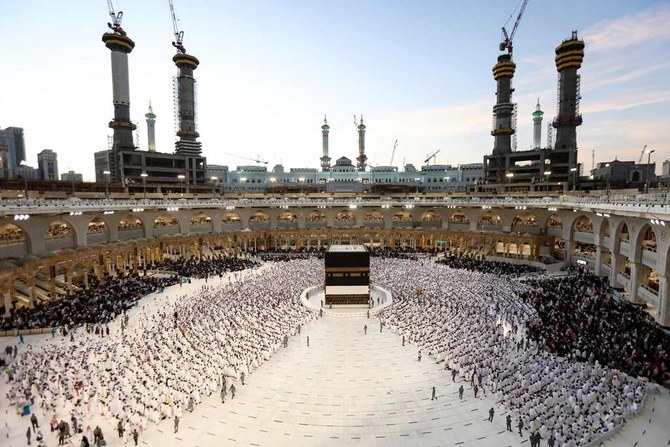MAKKAH: A million pilgrims began the spiritual journey of a lifetime as the first rituals of the annual Hajj began.
Hundreds of thousands of worshippers circled Islam’s holiest site, the Kaaba at the Grand Mosque in Makkah. Many held umbrellas to block the sun as the temperature climbed to 42C.
On Thursday, the pilgrims will move to a vast tented city at Mina, about 5 kilometers from the Grand Mosque, ahead of the main rite at Mount Arafat, where the Prophet Muhammad delivered his final sermon.
Saudi authorities have mounted a massive operation to ensure the health and safety of pilgrims. The Saudi Health Ministry has prepared 23 hospitals and 147 health centres in Makkah and Madinah, the second-holiest city in Islam, to accommodate pilgrims.
Four hospitals and 26 health centers are also ready to treat pilgrims in Mina. There are more than 1,000 beds for patients requiring intensive care and more than 200 specifically for heatstroke patients, and more than 25,000 health workers are ready to respond to cases as they arise.
“It’s all going well so far. I have moved around a lot and saw rules are being respected,” said Faten Abdel Moneim, 65, a mother of four from Egypt.
Naima Mohsen, 42, also from Egypt, said: “Being here is the best thing that has ever happened to me. I can’t wait for the rest. My only problem is the weather. It’s just too hot.”
FASTFACTS
• The Hajj follows a route Prophet Muhammad walked nearly 1,400 years ago and is believed to trace the footsteps of the prophets Ibrahim and Ismail.
• The Qur’an says that all Islam’s followers who are physically and financially able should make the pilgrimage once in their lifetime.
One million fully vaccinated Muslims, including 850,000 from abroad, are allowed at this year's Hajj, after two years of curtailed numbers because of coronavirus pandemic restrictions.
In 2019 about some 2.5 million Muslims from around the world took part in Hajj, but after that the pandemic forced a downsizing. Only 60,000 fully vaccinated residents of the Kingdom took part in 2021, up from a few thousand in 2020.
The restoration of the Hajj stirred bittersweet emotions for pilgrims Sutrisno and Sri Wahyuningsih, two teachers from Indonesia. Sri’s parents were supposed to take part in 2020, but their plans fell victim to the pandemic.
Sri’s father will now never make the journey after he died from a stroke in March, and her mother could not take part because she is over this year’s age limit of 65.
Nevertheless, Sutrisno, 54, and Sri, 51, are joyful at undertaking the Hajj in place of Sri’s parents. “It’s such a huge moral burden to me,” said Sri. “But my mother has given her blessings to me and I have to think that this is a journey I have to go through, everything is Allah’s decision, and I have to go on the Hajj.”
















